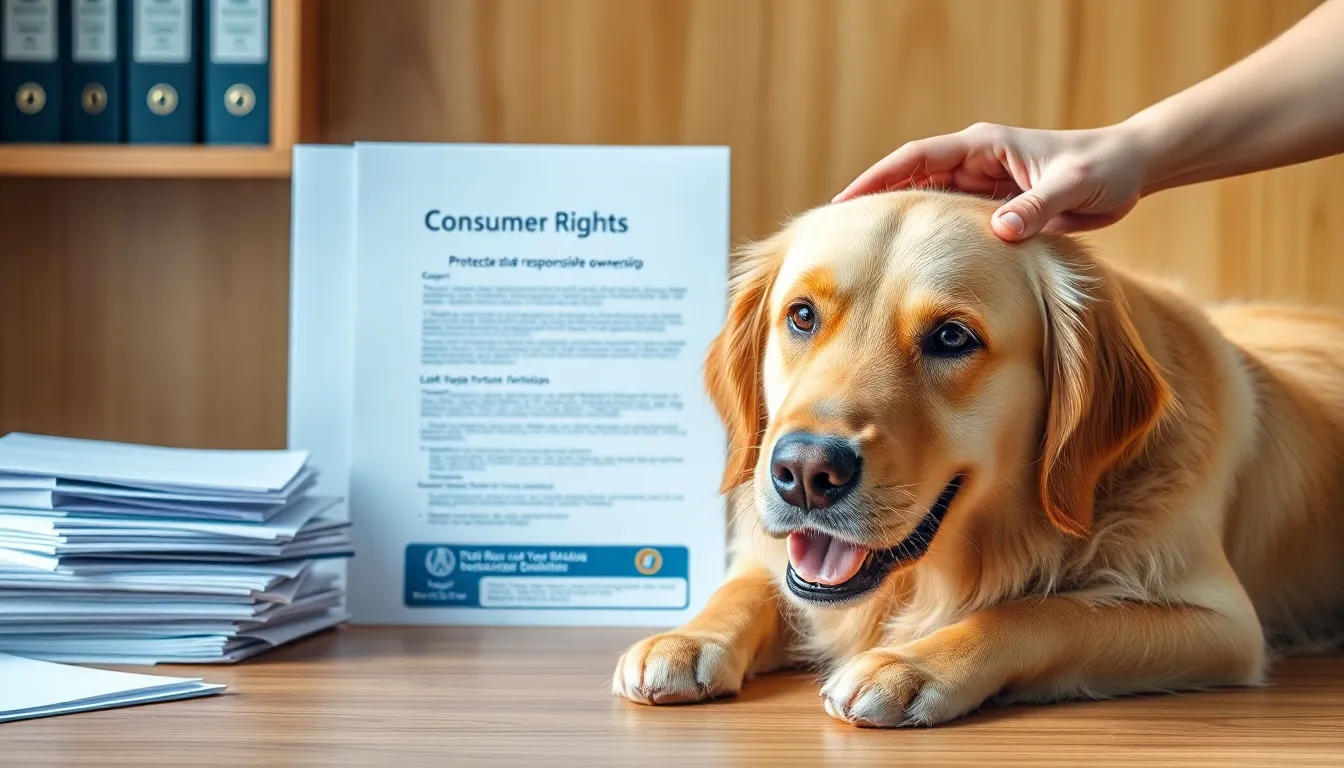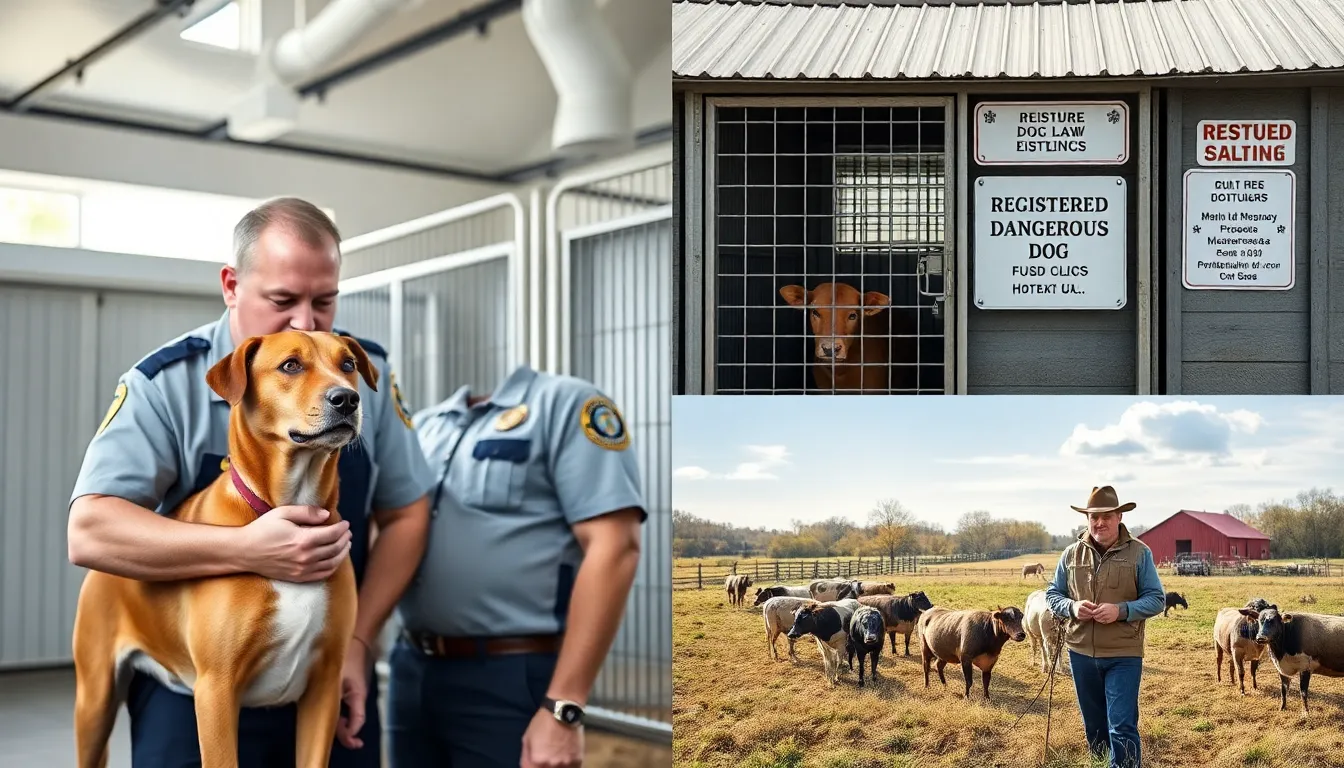Pennsylvania’s comprehensive PA’s Dog Laws establish clear regulations for responsible dog ownership, covering everything from early-life care to public safety measures. These mandates ensure proper identification, health protection, and ethical treatment for all dogs within the state.
Key Implications
- Mandatory Ownership Responsibilities: Pennsylvania law requires all dogs to be licensed by 8 weeks or 3 months of age, mandates rabies vaccinations by 3 months, and prohibits puppy transfers before 8 weeks, ensuring foundational care and identification.
- Animal Welfare and Consumer Safeguards: Stringent prohibitions against animal cruelty and abandonment, alongside the “Puppy Lemon Law,” protect animals from mistreatment and provide consumers with crucial rights regarding the health of newly purchased dogs.
- State-Level Enforcement and Public Safety: The Bureau of Dog Law Enforcement actively upholds these laws through annual kennel inspections, investigation of illegal operations, maintenance of a Dangerous Dog Registry, and support for the agricultural community.

Early-Life Licensing by 8 Weeks Old Plus 3-Month Rabies Mandates in PA
Pennsylvania law sets forth clear regulations for responsible dog ownership. These comprehensive rules cover essential aspects like licensing timeframes, age requirements for transfers, and mandatory vaccinations. They also define criteria for kennel operations. Adhering to these mandates ensures proper identification, early care, and public health protection for all dogs across the state. Understanding these specific requirements under PA’s Dog Laws is not just a legal obligation, but a cornerstone of ethical pet care.
Key Licensing Deadlines for Dog Owners
For individual dog owners in Pennsylvania, one of the first and most crucial legal responsibilities is licensing. All dogs must obtain a license quite early in their lives. Specifically, owners must secure a license by the time their dog reaches 8 weeks old or 3 months of age, whichever milestone occurs first. This early licensing initiative ensures that almost all dogs in the state are registered promptly. Beyond the initial application, all dog licenses must also be renewed annually by January 1st, maintaining an up-to-date registry of the state’s canine population. This system helps in reuniting lost pets with their families and funding animal welfare programs.
The reasoning behind these stringent early licensing requirements is multifaceted. It provides a foundational record for each dog, critical for public safety and disease control. When a dog is licensed, it often carries an identification tag, which is invaluable if the animal becomes lost. Moreover, the licensing fees contribute directly to state and local animal control services, supporting shelters and enforcement efforts. Therefore, complying with these licensing provisions is a direct way for owners to contribute to the overall well-being of the animal community in Pennsylvania.
Minimum Age Restrictions for Puppy Sales and Transfers
Another vital component of Pennsylvania’s animal welfare statutes pertains to the handling and transfer of young puppies. To safeguard the health and development of vulnerable young animals, strict minimum age restrictions are enforced. The law explicitly states that no dog under 8 weeks of age may be sold, traded, bartered, auctioned, or otherwise transferred to a new owner. This regulation is critical for preventing premature separation of puppies from their mothers, which can lead to significant health and behavioral issues.
Puppies need their mother’s milk and companionship during their initial weeks for optimal physical and emotional development. Early separation can compromise their immune systems and their ability to socialize properly, leading to anxiety or aggression later in life. Responsible breeders and individuals alike must adhere to this critical aspect of PA’s dog laws. Ensuring a puppy reaches at least 8 weeks of age before transfer supports their crucial early developmental milestones, setting them up for a healthier transition into their new homes. Prospective pet owners should always inquire about a puppy’s age and verify it before finalizing any adoption or purchase.
Mandatory Rabies Vaccination Requirements for Dogs and Cats
Public health is a paramount concern addressed by Pennsylvania’s animal laws, particularly regarding rabies vaccination. Both dogs and cats within the state are subject to mandatory rabies vaccination requirements. All dogs and cats must receive a current rabies vaccination once they reach 3 months of age or older. This vaccination is not merely a recommendation; it is a legal imperative designed to protect both animal and human populations from a deadly disease. Rabies is a viral disease that attacks the central nervous system, and it is almost always fatal once symptoms appear.
Maintaining an up-to-date rabies vaccination status for pets significantly reduces the risk of outbreaks. This statewide mandate creates a collective immunity among companion animals, thereby acting as a critical barrier against disease transmission. Pet owners are responsible for keeping accurate records of their pets’ vaccination dates and ensuring booster shots are administered according to veterinary recommendations. Failure to comply can result in legal penalties and, more importantly, put both pets and people at risk. This proactive health measure underscores Pennsylvania’s commitment to public safety.
Defining Criteria for a Kennel License
For individuals or businesses involved in keeping or transferring a larger number of dogs, Pennsylvania law outlines specific criteria for obtaining a kennel license from the Department of Agriculture. A kennel license is required for any establishment that keeps or transfers at least 26 dogs in a calendar year. This threshold is important for regulating larger-scale operations. Additionally, any establishment that operates specifically as a boarding kennel, regardless of the annual number of dogs kept or transferred, must also possess this license. This ensures oversight for facilities that temporarily house other people’s pets.
These licensing requirements extend beyond mere registration. They mandate compliance with comprehensive standards concerning housing conditions, sanitation protocols, veterinary care, and general animal welfare. The Department of Agriculture conducts inspections to ensure licensed kennels meet these stringent guidelines, protecting the well-being of the animals under their care. From large commercial breeding operations to smaller boarding facilities, these regulations under Pennsylvania’s comprehensive dog laws framework aim to maintain a high standard of animal husbandry. This framework helps prevent neglect, abuse, and the spread of disease in environments where multiple animals are housed together, reinforcing the state’s commitment to responsible animal stewardship.

Consumer Protections: ‘Puppy Lemon Law’ & Cruelty Prohibitions in PA
Pennsylvania law provides comprehensive protections for animals and individuals. It establishes strict prohibitions against animal cruelty and abandonment. This legal framework also includes specific consumer protections for individuals purchasing dogs. Understanding PA’s dog laws is crucial for pet owners and prospective buyers.
Protecting Animals: Prohibitions Against Cruelty and Abandonment
The Commonwealth of Pennsylvania maintains rigorous standards for animal treatment. It is unequivocally illegal to mistreat or abuse any animal within state borders. This broad prohibition covers acts of physical harm, neglect, and psychological torment. Violators face significant legal consequences, including fines, imprisonment, and forfeiture of their animals.
Furthermore, the abandonment of dogs is met with severe legal repercussions. It is illegal to abandon or attempt to abandon any dog in Pennsylvania. This legislation underscores the lifelong responsibility of pet ownership. Leaving a dog unattended with no intention of returning constitutes a serious offense.
A critical component of public safety involves safeguarding against harmful substances. It is strictly illegal to place any poison or harmful substance in any location. This prohibition applies to both private and public properties. These critical public safety measures protect all canine residents, whether pets or strays.
The ‘Puppy Lemon Law’: Safeguarding Dog Purchasers
Beyond preventing cruelty, Pennsylvania also offers robust protections for consumers in pet transactions. The Dog Purchaser Protection Act is widely known as the “Puppy Lemon Law.” This landmark legislation addresses the ethical sale of dogs within the state. It ensures that buyers receive healthy animals from responsible sellers.
Under this vital act, dog sellers and breeders assume clear obligations. They must post a prominent, visible notice of consumer rights at their business location. Additionally, they are legally required to provide a written copy of these rights to the buyer at the time of sale. This crucial disclosure empowers buyers with essential information.
These mandated disclosures inform consumers about their specific protections. Buyers gain clarity on their options if a newly purchased dog becomes ill or exhibits undisclosed health issues. This legal framework helps prevent fraudulent practices by unscrupulous sellers. Understanding these consumer protections is vital for any prospective dog owner in Pennsylvania.
The law outlines specific conditions under which a consumer can seek remedies. If a veterinarian diagnoses a dog with a health problem within a certain timeframe, buyers have options. These may include returning the dog for a refund or exchanging it for another animal. Alternatively, the buyer might receive reimbursement for veterinary expenses.
Understanding the full scope of animal-related legislation in Pennsylvania extends to local ordinances. These local rules can vary, adding layers of specific responsibilities for pet owners. Adhering to these diverse aspects of Pennsylvania’s canine legal framework is paramount. It helps ensure harmony within communities and safe environments for all animals.
Staying informed on all animal welfare news and local advisories is part of being a responsible dog owner. Review recent animal welfare incidents to understand their impact and preventative measures.

Twice-Annual Inspections & Dangerous Dog Registry Uphold PA Laws
The Bureau of Dog Law Enforcement plays a truly critical role in upholding PA’s Dog Laws, acting as the cornerstone for ensuring animal well-being and public safety across the Commonwealth. Through a multifaceted approach that includes rigorous inspections, detailed investigations, and meticulous registry management, the Bureau ensures compliance with state regulations.
Their work is essential for maintaining the health and safety of both canine populations and Pennsylvania residents. The Bureau’s oversight helps to prevent cruelty, control dangerous animals, and support the state’s agricultural sector, illustrating a comprehensive commitment to responsible dog ownership and enforcement.
Mandated Inspections for Compliance and Welfare
A cornerstone of the Bureau’s efforts involves stringent inspection protocols. All state-licensed kennels, regardless of size or purpose, undergo a minimum of two inspections annually. These frequent checks ensure that facilities meet established standards for sanitation, animal care, and overall welfare, safeguarding the thousands of dogs housed within them.
Beyond kennels, registered dangerous dogs are also subject to at least twice-annual inspections. These visits verify that owners are complying with strict containment and handling requirements designed to protect the public. Such consistent oversight is vital for upholding public safety and reinforcing the seriousness of Pennsylvania’s dog laws concerning dangerous animals.
Investigating Illegal Operations and Maintaining Registries
A significant enforcement activity for the Bureau is the investigation of illegal kennel operations, commonly referred to as “puppy mills.” These investigations target facilities that often operate without licenses and neglect animal welfare. The Bureau’s proactive stance helps to dismantle these inhumane operations, rescuing animals from substandard conditions and holding irresponsible breeders accountable.
Furthermore, the Bureau is responsible for maintaining a statewide Dangerous Dog Registry. This crucial administrative function tracks dogs that have been legally declared dangerous, providing law enforcement and the public with vital information. The registry aids in monitoring these animals and ensuring adherence to specific legal mandates, thereby enhancing overall community safety.
Protecting Pennsylvania’s Agricultural Community
The Bureau of Dog Law Enforcement also extends its protective reach to Pennsylvania’s vital agricultural sector. A unique and critical function is its responsibility for reimbursing farmers for damages to livestock caused by dogs or coyotes. This program offers financial relief to farmers who suffer losses due to canine predation, acknowledging the significant economic impact such incidents can have.
This reimbursement mechanism underscores a broader understanding of the challenges faced by rural communities. It reinforces the importance of responsible dog management and wildlife control. By mitigating these agricultural losses, the Bureau helps to sustain farming livelihoods and promote harmonious coexistence within the state, directly supporting the spirit of PA’s Dog Laws.
Ultimately, the Bureau’s diverse responsibilities, from detailed inspections to critical investigations and supportive reimbursement programs, form a robust framework. This framework ensures the well-being of animals and people alike, demonstrating a holistic approach to upholding and enforcing PA’s Dog Laws across the Commonwealth.
Featured image generated using Flux AI
